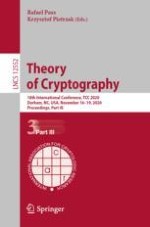
2020 | OriginalPaper | Buchkapitel
Universal Composition with Global Subroutines: Capturing Global Setup Within Plain UC
verfasst von : Christian Badertscher, Ran Canetti, Julia Hesse, Björn Tackmann, Vassilis Zikas
Erschienen in: Theory of Cryptography
Aktivieren Sie unsere intelligente Suche, um passende Fachinhalte oder Patente zu finden.
Wählen Sie Textabschnitte aus um mit Künstlicher Intelligenz passenden Patente zu finden. powered by
Markieren Sie Textabschnitte, um KI-gestützt weitere passende Inhalte zu finden. powered by
Abstract
-
We extend UC-emulation to the case where both the emulating protocol \(\pi \) and the emulated protocol \(\phi \) make subroutine calls to protocol \(\gamma \) that is accessible also outside \(\pi \) and \(\phi \). As usual, this notion considers only a single instance of \(\phi \) or \(\pi \) (alongside \(\gamma \)).
-
We extend the UC theorem to hold even with respect to the new notion of UC emulation. That is, we show that if \(\pi \) UC-emulates \(\phi \) in the presence of \(\gamma \), then \(\rho ^{\phi \rightarrow \pi }\) UC-emulates \(\rho \) for any protocol \(\rho \), even when \(\rho \) uses \(\gamma \) directly, and in addition calls many instances of \(\phi \), all of which use the same instance of \(\gamma \). We prove this extension using the existing UC theorem as a black box, thus further simplifying the treatment.